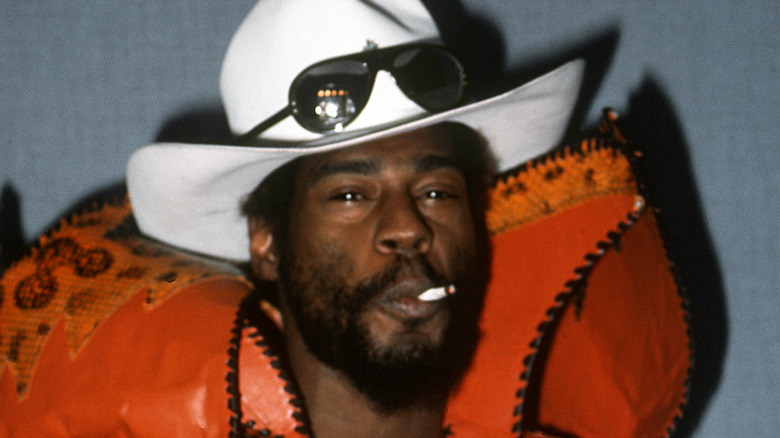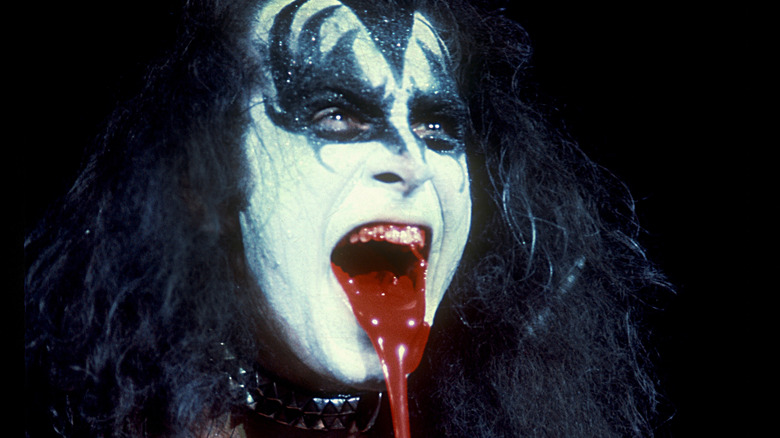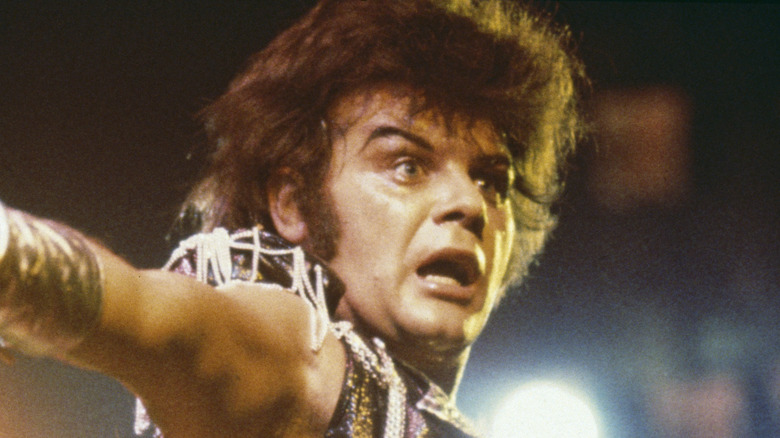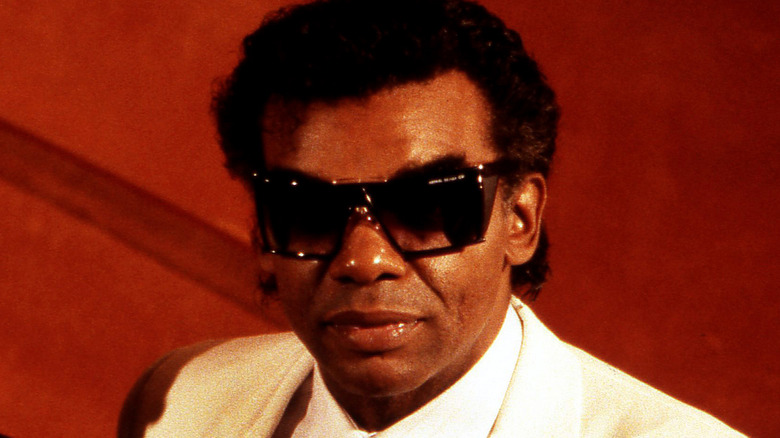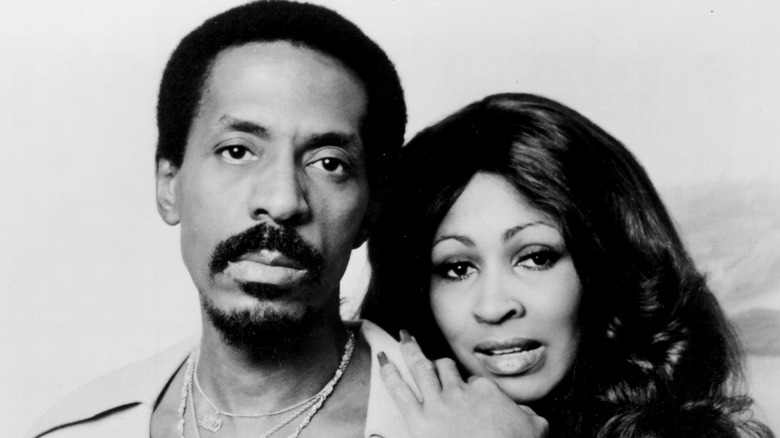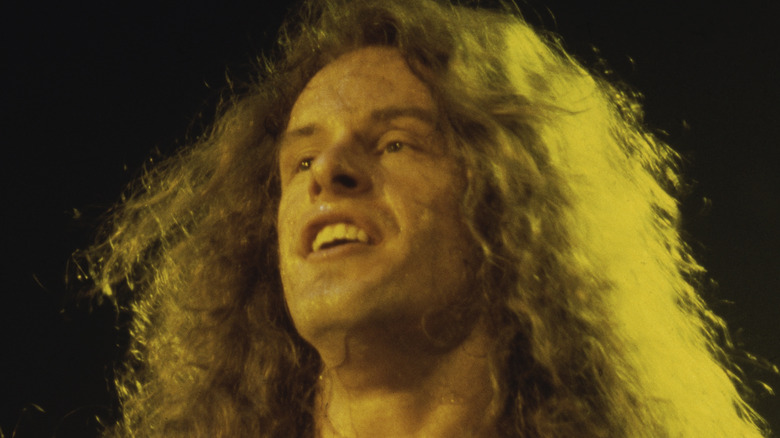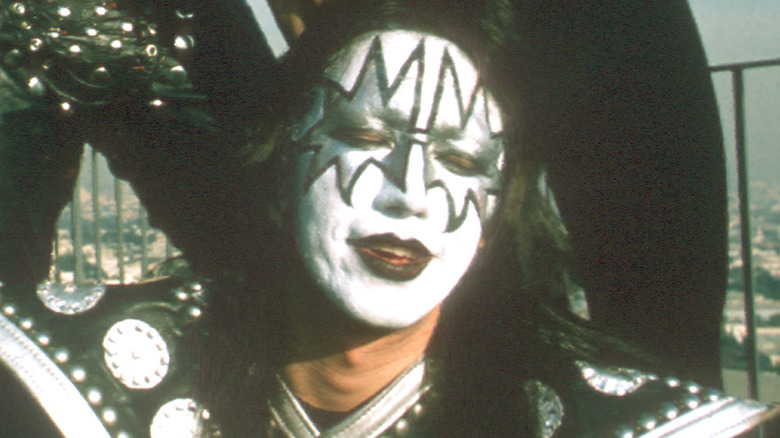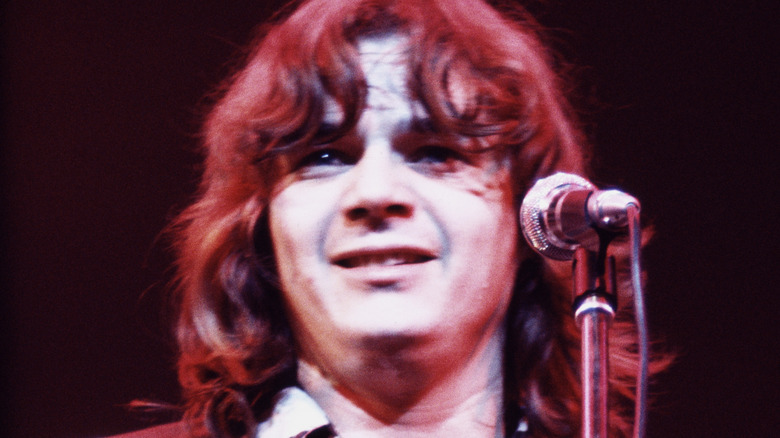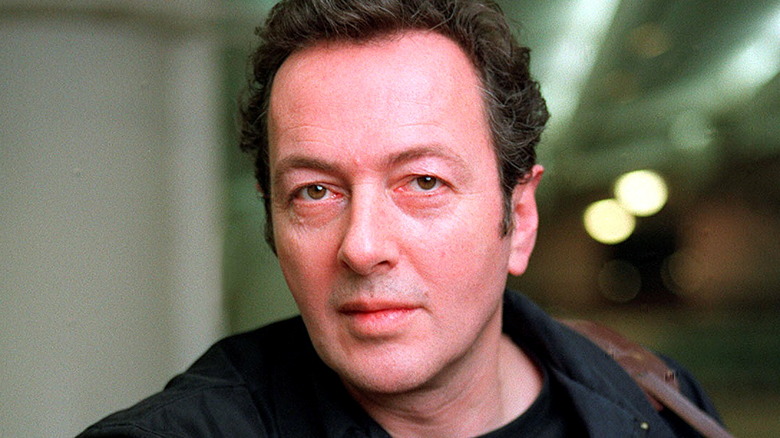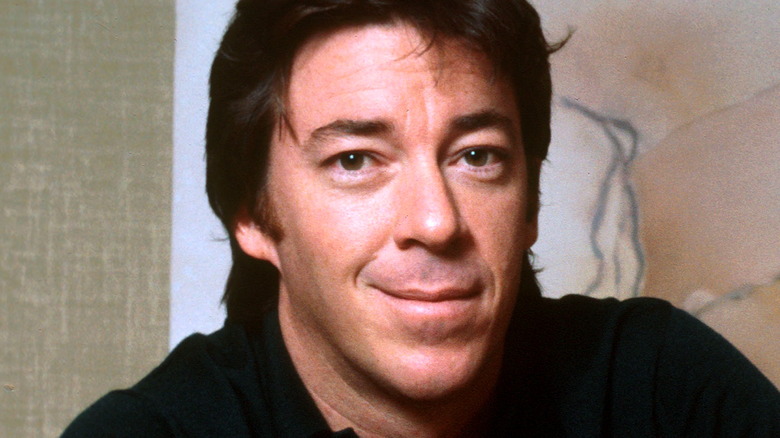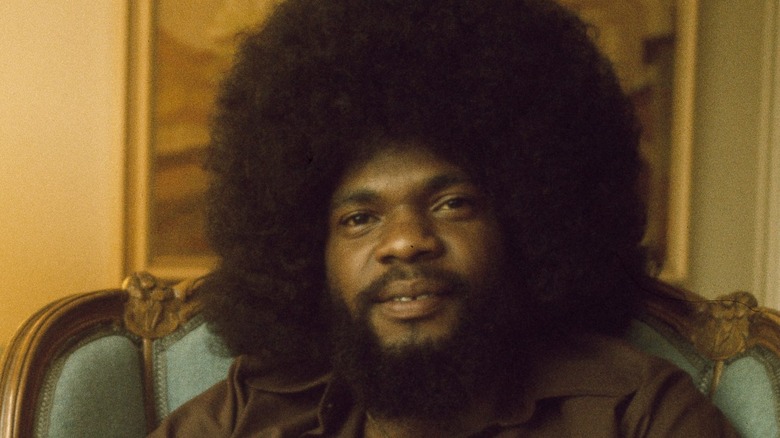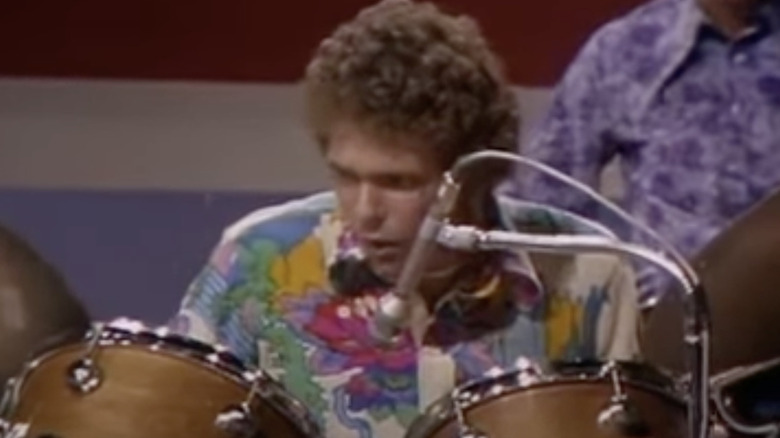'70s Rock Stars Accused Of Serious Crimes
The 1970s were packed with some of music's biggest stars, with legends and icons whose songs continue to be sung to this day — from rockers like Led Zeppelin, crooners like Ike Turner, and flashy showmen like David Bowie. But the 1970s were also one of the wildest decades in America's history, with the pall of war in the east hanging over counter culture, while free love movements gave way to disco fever. So it should come as no surprise that some of the decade's most prominent musical acts — rock stars, or otherwise — got into just as much trouble off stage as they had hits on stage.
Whether it was during the decade that they ran afoul of the law, or decades later that serious allegations were leveled against them, here are some of the biggest artists of the 1970s who were accused of serious crimes.
Ozzy Osbourne
Frontman of the pioneering heavy metal group Black Sabbath throughout the 1970s, Ozzy Osbourne had arguably his biggest career moments in that decade. Known for his wild personality, and even wilder on-stage persona (he infamously bit the head off of a real bat on stage, according to Rolling Stone), he's also had his share of run-ins with the law. Arrested in 1984 in Memphis for public drunkenness (via the Kentucky New Era), and accused of domestic violence by his wife Sharon Osbourne, as per the Sun, it was his antics in Texas in 1982 that top the list.
As Rolling Stone details, while visiting San Antonio for a concert in February of that year, Ozzy was caught urinating at a monument near the famous Alamo landmark and was subsequently arrested and jailed for public intoxication and urination. Thankfully for his thousands of fans who came to the city to see him perform, Ozzy was able to make bail and play the gig at the HemisFair Arena. Banned from the state for a decade, he would eventually be pardoned for the offense after donating to a local charity, and in 2015 he made an emotional visit back to the site of his famous failure, with the return chronicled by Rolling Stone.
Jackson Browne
Jackson Browne reached the height of his fame in the mid 1970s and has been nominated for seven Grammys. His 1972 self-titled debut album made it to No. 53 on the Billboard top 200, with the song "Doctor, My Eyes" becoming an unexpected hit and topping out at No. 8 on the singles charts. He had four more albums released through the rest of the decade, as per AllMusic, and while he's never stopped recording, he has never matched that prolific output. A success with his guitar, he found trouble in love and had serious accusations leveled against him by at least one former partner.
Following his split from Hollywood actress Daryl Hannah in 1992, the starlet made serious allegations of domestic abuse against Browne, as reported by the Los Angeles Times. Accusations that he had beaten Hannah followed Browne for years, but the artist eventually prevailed in a defamation suit in 2003 (via Billboard), putting to rest the long-standing rumors following a documentary released by 20th Century Fox that repeated the allegations. "I never assaulted Daryl Hannah, and this fact was confirmed by the investigation conducted at the time by the Santa Monica Police Department," a statement read from Browne following the suit.
Dickey Betts
Though The Allman Brothers struggled to chart in their first couple of years, the band had a breakout success with "At The Fillmore East," a double live album released in 1971, turning them from underground rockers to influential stars (via AllMusic). Rounding out the group after the pair of siblings Gregg and Duane Allman were bass guitarist Berry Oakley, percussionists Butch Trucks and Jai Johanny Johanson, and guitarist Dickey Betts. The rock icons went on to release 12 studio albums and even more live albums. As with most musicians in the 1970s, members of the group were heavily involved in drug use, notes the New York Daily News, but that's not what earns Betts a spot on this list. Instead, it's his arrest for trespassing and indecent acts while at a strip club in Sarasota, Florida.
As a report stated in the Tampa Bay Times, Betts was accused of "acting obscenely" at the club. Though as a legendary rocker you might think this incident occurred while on tour in the 1970s, it instead occurred in 1997, when Betts was 53 years old. According to the report, Betts refused to leave the establishment and was arrested. He was later released after being fingerprinted and photographed by Sarasota County police.
Donald Fagen
A mix of jazz, pop, blues, and rhythm and blues, the '70s rock group Steely Dan was formed by Walter Becker and Donald Fagen, with some of their hits including "Do It Again" and "Dirty Work" from their debut album (via AllMusic). They'd survive a decade-plus hiatus throughout the 1980s and into the '90s, during which Fagen would go solo, releasing a pair of his own albums (via Discogs). As a part of Steely Dan, Fagen would be elected to the Rock & Roll Hall Of Fame in 2001. Fagen however would also find himself running afoul of the law — and his partner — after being accused of and charged with domestic assault against his wife, Libby Titus, in 2016, according to the Denver Post.
Police reports indicated that Fagen was alleged to have violently pushed his wife into a window and knocked her to the ground during an altercation in their Manhattan apartment. The criminal complaint against Fagen stated that Titus suffered significant injuries, including "bruising and swelling to her right arm, as well as substantial pain." Just a few days following the incident, however, it was reported that Fagen and Titus had reconciled (via Page Six)
George Clinton
Trailblazing funk legend George Clinton came to fame in the 1970s as the leader of the iconoclastic Parliament, as well as founder of psychedelic funk rock group Funkadelic. Over the years his collective of rotating musicians became known as "Parliament-Funkadelic," and Clinton has become widely known as the Prime Minister of Funk (via Metro Times). With the brilliance and ability to blend disparate musical styles together, Clinton was an industry outsider who managed to forge a legacy in the genre matched by few others, and his style and influence in music and fashion cannot be understated, notes The New Yorker.
But as the foremost artist working in the psychedelic genre, it should come as no surprise that Clinton has been mixed up in the drug scene since the very beginning. He faced serious charges in different instances throughout his career, but at least one of those charges led to consequences. As reported by the Los Angeles Times, in 2003 he was arrested on drug possession charges when officers found him in his car with a large quantity of cocaine and other drug paraphernalia. Clinton voluntarily admitted what he had on him and pled no contest. He was handed down a sentence of 200 hours of community service and two years of probation.
Pete Townshend
Co-founder of '70s band, The Who, Pete Townsend's crime ultimately proved to be false, but in an unexpected twist, was a life-changing incident. In 2003, he was arrested on suspicion of possessing child pornography (via the New York Times). The accusations stemmed from his connection to a website that purveyed such content, with Townshend using his credit card to access the site. Townshend immediately denied the charges. Though he admitted to using the website, he claimed he did so as part of his research into child abuse for his own autobiography, saying he was intending to prove how banks played a part in the exploitation of children.
Thankfully for Townshend and his fans, the star was cleared of all charges following an investigation, although he was placed on a national register of sex offenders, reports MTV. But what makes this story even more remarkable is that Townshend believes that the incident saved his life (via the Daily Mail). According to the musician, the duration of the investigation gave him time to get a much-needed colonoscopy that revealed malignant polyps. "The doctor showed me the polyp. He said, 'This would have killed you in six months.'" Despite the positive outcome, Townshend admits the arrest and charges still trouble him.
Sid Vicious
Possibly one of the most famous true crime stories in music in the 1970s, controversial singer/bassist Sid Vicious was accused of murdering his girlfriend, Nancy Spungen. Fueled by a mutual addiction to hardcore drugs — and a risky lifestyle of unpredictable behavior — the two were together when the Sex Pistols broke up in 1978, after which they began collaborating musically, with Spungen acting as a quasi-manager, as per Biography, as Vicious embarked on a solo career. Sadly, neither Vicious' post-Sex Pistols career, nor Spungen's vibrant life, would continue much longer after that.
As Rolling Stone details, in October of '78, Spungen would be found dead in her room at the Chelsea Hotel, having bled to death on the floor of her bathroom from a stab wound to the stomach. She was just 20 years old. Found stumbling through the hotel hallways afterwards, Vicious was taken into custody and charged with her murder. He seemingly confessed to the crime initially but recanted shortly thereafter. There have been rumors that it may have been an attempt at a murder-suicide, but the rocker would die of a drug overdose before trial, leaving the truth a mystery.
Gene Simmons
Clad in over-the-top theatrical costumes and covered in facial make-up, the rock 'n' roll foursome called KISS took on supernatural identities as "The Starchild," "The Cat," and "The Spaceman," and became the idol of millions (via Biography). But leading the crew was "Demon," Gene Simmons, with his long black cape and suggestively long, waggling tongue. Unfortunately, the sexual innuendo of Simmons-penned KISS songs like "Love Gun" and "Nothin' To Lose" became more than lyrics when in 2017 the rocker was accused of sexual misconduct by a local radio DJ.
Though the disc jockey would go unnamed, she would file suit in Los Angeles Superior Court, reports IndyStar, in December of that year on charges of sexual battery and "unwarranted sexual advances" during an on-camera interview that occurred at the San Manuel Casino location of the Rock & Brews restaurant co-owned by Simmons. The suit alleged that the advances began when Simmons placed the woman's hand forcefully on his own knee. It went on to state that he continued the advances to the point of turning innocent interview questions into "sexual innuendos" before he "forcibly flicked/struck" her in the throat, as per The Sun. The lawsuit was eventually settled out of court, but in its wake came more allegations of groping and sexual misconduct, including an accusation from his bandmate Ace Frehley, reports USA Today, who claimed Simmons once groped his wife.
Don Henley
Don Henley was the longtime guitarist, singer, and drummer of The Eagles, a group that successfully straddled the line between pop, rock, and country. Founded in 1971, the group went on to amass 18 Grammy nominations and six wins (via Grammy.com), including a nomination for Best New Artist for their self-titled debut album. Henley boasted a successful solo career as well, with five studio releases, with his latest, the 2015 release "Cass County" debuting at No. 1 on the Country Billboard charts, as per Rolling Stone. Despite his success though, there's one incident in his career that he'd surely like to forget. It all originated with a call to 9-1-1 in 1980 placed from Henley's Los Angeles home.
Los Angeles Firefighters responded to the call and discovered a shocking sight: a naked 16-year-old sex worker suffering from an overdose of cocaine (via Broward Palm Beach New Times). While it may be tough to believe his story, Henley insisted he didn't know the girl's age and claimed he never had any sexual contact with her. While he blamed his band's roadies for her drug use, Henley still pled no contest to charges of contributing to the delinquency of a minor and was sentenced to two years of probation. Some consider it a light punishment and feel he should have seen more accountability, notes The Week.
David Crosby
The man behind the first name in the '70s folk rock group Crosby, Stills, Nash, and Young, David Crosby has had quite the musical career, but also a controversial personal life. While he and Stephen Stills, Graham Nash, and Neil Young were lighting up the airwaves with hits like "Our House," Crosby himself was battling drug problems (via the New York Post), particularly a startling cocaine addiction. In 1982, however, things became more serious when he was arrested on drug and weapons charges at a Dallas nightclub for possession of a handgun and use of cocaine. After failing a stint in rehab as part of a plea deal, he was sentenced the next year to five years in prison, as per Ultimate Classic Rock. Though incredulous at the ruling, he still managed to be released on parole after just five months.
Unfortunately, his drug problems — and legal issues — were far from behind him, as his arrest some 22 years later will attest. In March of 2004, Crosby was taken into custody at his Times Square hotel in New York City after playing a show in Wayne, New Jersey. Apparently, Crosby had left behind an incriminating piece of luggage that contained not just drugs — in this case marijuana and associated paraphernalia — but also a loaded .45 caliber handgun (via the New York Times). Crosby pled guilty this time and received a fine.
Gary Glitter
Gary Glitter was born Paul Gadd (via BBC) but took up a stage name persona as the glam rock movement picked up steam in the 1970s. Unfortunately, nearly the entirety of his career has been checkered with trouble including a decade-long driver's license suspension for which he nearly got prison time (via The Guardian). But Glitter would take his drug and alcohol problems much further with offenses far more heinous than drinking and driving or snorting cocaine.
The worst of it began in 1997, when Glitter was arrested in a computer shop after a stash of child pornography was found on his computer's hard drive, reports the Irish Times. After being sentenced to just four months prison in 1999, Glitter took up a new name and relocated to Spain where he lived for a time before being discovered. He then fled to Cambodia (via Olive Press), then Vietnam, all the while assaulting underage girls. Finally caught (via People), Glitter was extradited and sentenced to 16 years in prison in 2015, reports The Daily Mail.
Ronald Isley
One of the original Isley Brothers trio that also included his brothers O'Kelly and Rudy, Ronald Isley would welcome many other members of the family into and out of the group over the years. Though they entertained audiences with Motown-inspired tunes as early as the 1950s, the Isley Brothers found further success in the '70s, when they began mixing rock 'n' roll and funk into their repertoire (via AllMusic). As lead singer, Ronald is also the only Isley brother to be a part of the group for their entire lifetime, from their 1959 album "Shout!" right up until 2017's "The Power Of Peace." His tremendous success with the group led to legal troubles, though, as he amassed a small fortune in earnings from his musical career and wanted to make sure he kept every cent of it.
It was in 2006 that Ronald was brought to trial for tax evasion, as per Today, with $3.1 million in back taxes unpaid and still owed to the Internal Revenue Service. Sentenced to three years and one month in prison for his financial crime, Ronald's attorney pleaded for a reduced sentence due to the artist's deteriorating health following a stroke, but the judge wasn't convinced. In 2010, Ronald was released from prison and immediately began recording again, with the album "Mr. I" dropping in November of that year.
Ike Turner
As talented and popular of a singer as Ike Turner was in the 1970s, he seems to have been equally successful when it comes to getting into trouble, with dangerous habits and bad behavior that caused legal problems throughout his career. Along with his wife, Tina Turner, Ike was part of one of the most popular double acts of their day. Together they were The Ike and Tina Turner Revue, but in 1976 it all came crashing down, thanks entirely to Ike Turner's abuse and unpredictable drug use. After years of violent outbursts aimed squarely at his wife, Ike's musical act with her fell apart when Tina fled from him while together in Dallas (via Biography).
Over the years, Tina Turner would discuss in great detail the abuse she endured while in her relationship with Ike, including broken bones from physical altercations, and fights that left her battered, bruised, and bloody, as per Hollywood Reporter. Ike Turner's troubles didn't end after Tina left however, with additional drug charges coming in 1985, according to the AP. He would ultimately die of a cocaine overdose in 2007, reports the Los Angeles Times.
David Bowie
According to Thrillist, a subculture of underaged female music fans, colloquially known as groupies, was a celebrated element of Los Angeles's rock n' roll culture in the early 1970s. One such member of this community was Lori Mattix, who started attending shows at clubs on the Sunset Strip at age 14. And one evening, she met era superstar David Bowie, touring in support of his "The Rise and Fall of Ziggy Stardust and the Spiders from Mars" concept album. Mattix described how Bowie asked her to his hotel room. "I was still a virgin and terrified," she said, and declined the offer.
About five months later, Bowie returned to Los Angeles and had his bodyguard ask Mattix, then 15, out to dinner on his behalf. After some cocktails and marijuana, Bowie took his large group of dinner companions, including Mattix, to his room at the Beverly Hilton. Shortly thereafter, Mattix said, Bowie asked the teenager to give him a bath, which she did, and then they had intercourse. When Mattix's 15-year-old friend and fellow groupie Sable Starr expressed anger that Bowie had chosen Mattix instead, she said that he initiated a second encounter that evening involving both teenagers.
Ted Nugent
Detroit-based hard rocker Ted Nugent fancied himself "The Motor City Madman" for his energetic, stunt-heavy, and shirtless stage performances. Primarily a guitarist and sometimes a singer, Nugent racked up a string of big hits in the '70s and early '80s that touched on violence, debauchery, and criminality, including "Stranglehold," "Cat Scratch Fever," and "Jailbait" (per HuffPost), the last being about a man's pursuit of a 13-year-old girl.
Being a man well into adulthood and going after minors was a subject Nugent reportedly and allegedly was familiar with off wax, too. In his episode of VH1's "Behind the Music," Nugent confirmed that he'd engaged in multiple encounters with women who were under the age of 18. He also discussed how in the 1970s, he became the legal guardian of 17-year-old Pele Massa. She was his girlfriend, and if he was responsible for her, he couldn't be charged with any sort of statutory assault. "I got the stamp of approval of their parents," Nugent said of Massa. "Because they figured better Ted Nugent than some drug-infested punk in high school." In 2018, Nugent denied the legal maneuvering on "The Joe Rogan Podcast," claiming he never adopted a teenage girlfriend.
Steven Tyler
Aerosmith have been scoring hits and filling arenas since the 1970s. The chief creative force in the band: songwriter and lead singer Steven Tyler, who has wailed his way through 50 years of hits like "Dream On," "Love in an Elevator," and "Cryin'."
In 2019, California lawmakers created a three-year period in which the victims of sexual assaults could file lawsuits against their abusers, even if criminal charges couldn't be assessed due to the statute of limitations. In December 2022, Julia Misley registered a case in Los Angeles Superior Court alleging sexual assault and battery on the part of 50 defendants, among them Aerosmith singer Steven Tyler.
Misley alleged that when she was 16, she met 25-year-old Tyler at a 1973 Portland concert, and that he took her to his hotel room. Misley confirmed she was a minor, and Tyler "performed various acts of criminal sexual conduct" (according to the suit), then flew her to other Aerosmith concerts for more encounters. In 1974, Aerosmith filed to become Misley's legal guardian so as to keep her close while touring. She alleges Tyler plied her with drugs and alcohol, didn't provide promised parental-type support, continued to assault her, and urged her to abort an unplanned pregnancy.
If you or anyone you know has been a victim of sexual assault, help is available. Visit the Rape, Abuse & Incest National Network website or contact RAINN's National Helpline at 1-800-656-HOPE (4673).
Ace Frehley
Kiss became a quintessential 1970s arena rock band thanks to a unique hook. Its members took on the personas of mythical characters, donning costumes and wearing makeup. Alongside Paul Stanley (Starchild), Gene Simmons (The Demon), and Peter Criss (The Cat), Ace Frehley (The Spaceman) played lead guitar on Kiss rockers like "Detroit Rock City," "Rock 'N' Roll All Nite," and "Plaster Caster." According to Guitar World, Stanley and Simmons fired Frehley from Kiss in the early 1980s for his unreliability, brought on by substance abuse issues.
In May 1983, Frehley was driving his DeLorean in White Plains, New York, when he got involved in a small wreck. As he argued with the driver of the other vehicle, police arrived, prompting Frehley to flee. A high-speed pursuit ensued, during which Frehley reached speeds of 90 mph — nicking other cars along the way — then drove around a roadblock before he abandoned the car and was arrested while on foot. Frehley was charged with drunken and reckless driving but was quickly released after making bail.
Frehley was sentenced to five years of probation and a suspended license after entering a guilty plea. Two years after that incident, Frehley was arrested again. He and his wife, Jenette, were charged with criminal possession of forged instruments after they were caught allegedly attempting to buy a controlled substance with a phony prescription.
If you or anyone you know needs help with addiction issues, help is available. Visit the Substance Abuse and Mental Health Services Administration website or contact SAMHSA's National Helpline at 1-800-662-HELP (4357).
Steve Miller
The Steve Miller Band's "Greatest Hits 1974–1978" is one of the best-selling albums of all time, with more than 15 million copies purchased. The group, led and fronted by San Francisco guitarist and singer Steve Miller, still dominates classic rock radio with well-known, blues-inflected '70s standards like "The Joker," "Take the Money and Run," and "Fly Like an Eagle."
On his 29th birthday in 1972, according to Rolling Stone, Miller drank two bottles of wine, then hit a Dallas bar for scotch. Later that night, he was arrested in the Dallas suburb of Highland Park for public intoxication and prowling.
Then in April 1975, according to Ultimate Classic Rock, police responded to a call at Miller's house and found a large fire burning. Its contents: the clothing and possessions of Benito Diorio. Miller was reportedly responsible for the bonfire. When confronted by police, Miller got into an altercation and was booked on a charge of resisting arrest. All charges were later dropped.
Joe Strummer
The Clash helped usher in the age of punk rock in the late 1970s. Highly political with lyrics heavily critical of institutions, the U.K. band would bring in reggae, dance, and disco elements to round out their sound, better reflecting a commitment to being a mouthpiece of Britain's disaffected youth. According to KEXP, they bore the moniker "The only band that matters."
In 1978, according to Chris Salewicz's "Redemption Song," the Clash played a show at the Apollo Theater in Glasgow, Scotland. The punk band put on a charged performance that agitated the audience to the point where bouncers and security guards allegedly roughed up some fans. Frontman Joe Strummer witnessed the violence and got so mad that he ended the band's performance and left the stage. At that point, other fans confronted Strummer and took him to task for not doing more to stop the bouncer attacks. "He was so angry he smashed a bottle and was immediately jumped on by plainclothes policemen," Clash member Mick Jones later told The Daily Record.
Two years later (per "Redemption Song"), Strummer would be arrested for another violent concert incident. While playing a show in Hamburg, Germany, several fans stormed the stage and attempted to grab the microphone to accuse the Clash of selling out. Strummer grew so incensed that he struck one fan in the head with his guitar. He was arrested and charged with assault.
Boz Scaggs
Big-voiced and soulful, Boz Scaggs injected some musical flavor into the guitar-based mainstream rock of the 1970s. An early member of the Steve Miller Band, Scaggs went solo and incorporated blues, jazz, R&B, and horns into pop-rock, scoring big hits in the process with "Lido Shuffle" and "Lowdown," as well as the multi-platinum, disco-adjacent LP "Silk Degrees."
In August 1985, according to the Associated Press, Scaggs was arrested and charged with a long list of vehicular crimes. After driving through a red light in San Francisco, police stopped the musician and issued a field sobriety test. Scaggs didn't pass, and police took him in and booked him at San Francisco's City Prison for suspected driving under the influence of alcohol, along with running a red light, and driving without his license on his person.
While there were some sketchy details in the case, like how Scaggs listed a local restaurant he owned as his home address, he made bail and was released.
Billy Preston
Keyboardist and singer Billy Preston was a wunderkind, backing up gospel icon Mahalia Jackson at age 10 and recording with Little Richard in his teens. He became a full-fledged rock star in the early 1970s after he joined the "Beatles" on the "Let It Be" album, leading to solo hits like the funk jam "Outa-Space" and the number one hits "Will It Go Round in Circles" and "Nothing from Nothing."
According to legal filings reported by the Associated Press, Preston drove to a known day laborer assembly spot in Santa Monica, California, in August 1991 and hired a 16-year-old boy. Preston then took the teenager to his home in Malibu where he smoked cocaine, and then showed the boy photos of a pornographic nature before attempting to assault him. Authorities filed charges of felony cocaine possession, misdemeanor counts of molestation, and showing explicit material to a minor.
Preston additionally faced charges over an incident that occurred the day before the encounter with the teenager: He allegedly hired another day laborer, took him to his home, and allegedly assaulted him with a deadly weapon. Preston entered a no-contest plea to some of the drug and assault charges as part of a deal, and the sexual crime charges were dismissed. Preston received a sentence of nine months in a drug rehab center and three months of house arrest.
Jim Gordon
He was a sideman, backing musician, and session drummer, but Jim Gordon ranks among the most prolific and important rock performers of the 1960s and early 1970s. Among the major recordings that included Gordon's drumming: Tom Petty and the Heartbreakers' debut album, Harry Nilsson's "Nilsson Schmilsson, the Beach Boys' "Pet Sounds," and Derek and the Dominoes' "Layla and Other Assorted Love Songs." That last one was an Eric Clapton-fronted band best known for its enduring classic rock radio staple "Layla," a hard-rocking lament of unrequited love that Gordon co-wrote.
By the late 1970s, Gordon's career and mental well-being declined. In 1978, Gordon sought treatment for his issues for the first of more than 15 times, court records obtained by Billboard indicated. Professionals were unable to stop what Gordon claimed was the voice of his mother, mentally torturing him on the inside. In 1983, he told police detectives that he "just snapped" — and that's why he fatally stabbed his 71-year-old mother.
Gordon remained in prison ever since his admission of murder and was denied parole in 2018 after his own attorney expressed worry that the musician could potentially hurt other people if ever released. He died March 2023, while still incarcerated.
If you or someone you know needs help with mental health, please contact the Crisis Text Line by texting HOME to 741741, call the National Alliance on Mental Illness helpline at 1-800-950-NAMI (6264), or visit the National Institute of Mental Health website.





